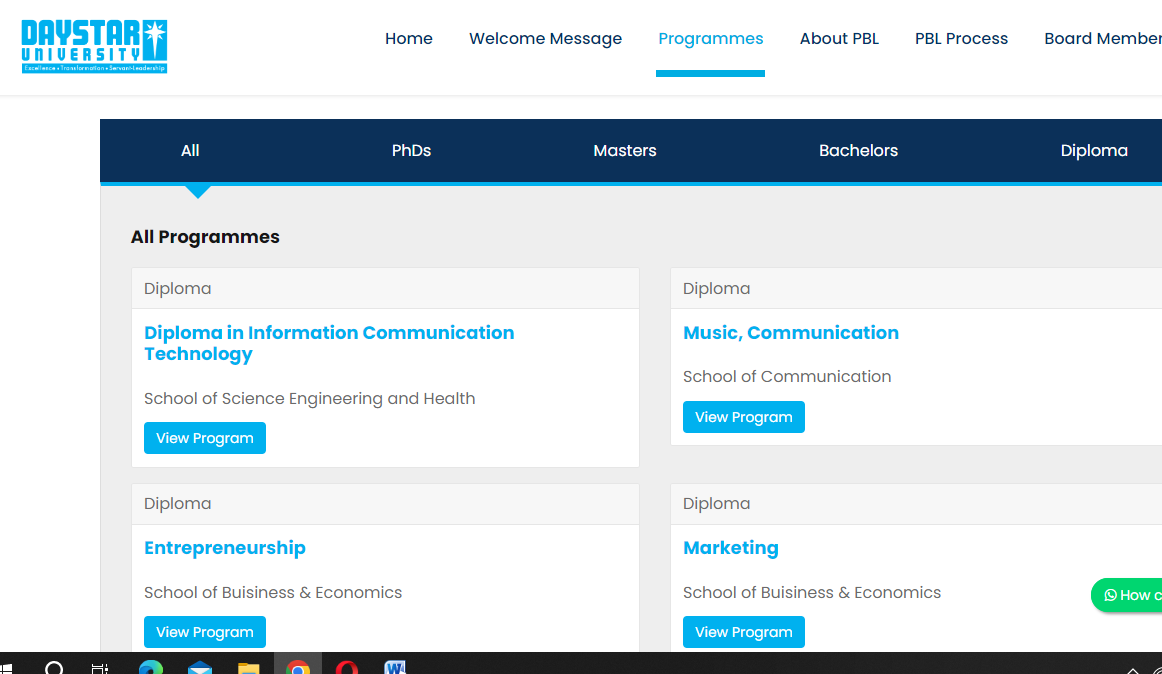Daystar University stands tall as a beacon of knowledge, innovation, and personal growth in Kenya, producing world famous and most renown alumni. As you embark on your academic journey, the choices you make can significantly impact your future, and selecting the right university and program is paramount. In this blog post, we will take you on a captivating journey through the corridors of Daystar University, shedding light on its diverse range of courses and the requirements that can set you on a path to success.
Daystar university courses and requirements
Daystar offers courses ranging from diploma, undergraduate, masters and PHD.
daystar university diploma courses and requirements
The minimum requirement for entry into Daystar diploma course is: A KCSE mean grade of C-(minus) , or a mean grade of C plain or one principal pass in ‘A’ levels or 4 credits or better in IGCSE, or their equivalent.
- Diploma in Information Communication Technology
- Music, Communication
- Entrepreneurship
- Marketing
- Purchasing and Business Logistics
- Human Resource Management
- Business Administration & Management
- Diploma in International Relations
- Diploma in Theology
- Diploma in Peace and Conflict Transformation
- Diploma in Counselling
- Diploma in Community Development
- Diploma in Agriculture
Daystar university undergraduate courses and requirements
Requirements
A mean grade of C+ (plus) and above in KCSE, or 5 credits in IGCSE with 2 credits passes in A level or division 2 in GCE.
- Bachelor of Science in Applied Computer Science
- Bachelor of Science in Environmental Health
- Bachelor of Science in Actuarial Science
- Bachelor of Science in Biomedical Science
- Bachelor of Science (Bsc) Nursing
- Bachelor of Law (LL.B)
- Bachelor of Arts
- B.A Accounting
- B.A Marketing
- B.A Purchasing and Business Logistics
- B.A Management Information Systems
- B.A Business Administration & Management
- Bachelor of Science in Economics
- Bachelor of Theology
- Bachelor of Education (B.Ed Sciences)
- Bachelor of Education (B.Ed Arts)
- Bachelor of Arts in Peace & Conflict Transformation
- Bachelor of Arts (BA) – Psychology and Counselling
- Bachelor of Arts Social Work
- Bachelor of Arts Monitoring and Evaluation
Daystar university masters courses
Requirements
The entry requirement is a Bachelors degree from an accredited university with a minimum cumulative GPA of 2.75 on a 4.00, or a degree awarded with First Class or an Upper Second Class Honours. Those whose GPA is 2.5 or who have Lower Second Class Honours and a Higher Diploma with relevant experience may be considered if the degree or diploma is relevant to the field of study.
- M.A Communication
- Master of Business Administration (MBA)
- MSc. Economics
- Master of Arts Christian Ministries
- Master of Arts in Diplomacy, Development, and International Security
- Masters of Arts in Counselling Psychology
- Master of Arts in Monitoring and Evaluation
- Masters of Arts in Child Development
- Masters in Clinical Psychology
- Master of Arts in Community Development
- Postgraduate Diploma in Child Development (PGDCD)
we are committed to providing our readers with the most up-to-date information regarding daystar courses. To ensure accuracy, we regularly monitor the university’s official website for any changes or updates to the course offerings. For your convenience and peace of mind, we provide a direct link that allows you to confirm the latest information directly from the source HERE. Your educational journey is important to us, and we strive to keep you informed every step of the way.

